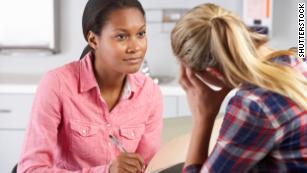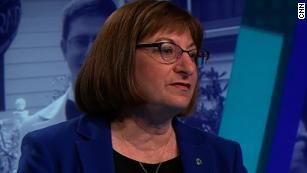No one is immune to suicide. But there is hope
That was the message Sunday on "Finding Hope," a CNN special report hosted by Anderson Cooper that featured a panel of guests and audience members affected by suicide.
The recent deaths of CNN celebrity chef Anthony Bourdain and fashion designer Kate Spade are the latest reminder that suicide is a complex and growing crisis in the United States, where such deaths have gone up over 25% in the past two decades.
"I
lost my brother Carter to it. Glenn Close nearly lost her sister,
Jessie. She got treatment, and both are here with us tonight," Cooper
said. "So is David Axelrod, whose father died by suicide, and Karl Rove,
whose mother did. And Zak Williams, who lost his father, actor and
comedian Robin Williams."
Axelrod
is a former senior adviser to President Barack Obama while Rove served
in the same role in President George W. Bush's administration.
"In
one way or another, everyone here tonight in this audience and with me
on stage has been touched by suicide, myself included," Cooper said.
Words matter
Actress Glenn Close described the jarring moment her sister, Jessie Close, opened up about having suicidal thoughts.
"She said, 'I need help. I can't stop thinking about killing myself.' And I was taken aback," Close said.
Close
offered to help her and did, but said when she looks back, she realizes
she never followed up to see if more support was needed.
While
it's important to offer our help to someone having suicidal thoughts,
it's also important to constantly check in and ask how they are doing,
said the actress.
And it can't be a one-time conversation, even if they say they're OK, Glenn Close said.
Zak Williams reiterated that it's crucial to reach out to people who are struggling and love them unconditionally.
Jessie
Close said when she asked her sister for help, a voice in her head was
repeatedly saying, "Kill yourself, kill yourself." She urged those
having suicidal thoughts that it's their responsibility to ask for help.
'My actions were different'
Former Navy SEAL Jimmy Hatch said his military friends saved him when he no longer wanted to live.
Hatch
felt lost after an injury in Afghanistan ended his military career, and
was going though a "transitional period," he said. His military friends
intervened when his wife ran out of options, and took him to a mental
hospital.
"I wasn't really crying
out. My words were great, but my actions were different. And those guys
who had been near me in gunfights and things like that, spent a lot of
time with me in the past, they realized that in spite of my words, I was
not well," he said. "And they came and injected themselves into my
life."
Loved ones question why
Axelrod
was in college when he heard that his father had killed himself. His
father was a psychologist who'd helped countless of other people with
suicidal thoughts.
Asking for help
The
suicide rate in the United States has seen sharp increases in recent
years. Studies have shown that the risk of suicide declines sharply when
people call the national suicide hotline: 1-800-273-TALK.
There is also a crisis text line. For crisis support in Spanish, call 1-888-628-9454.
The lines are staffed by a mix of paid professionals and unpaid volunteers trained in crisis and suicide intervention. The confidential environment, the 24-hour accessibility, a caller's ability to hang up at any time and the person-centered care have helped its success, advocates say.
The International Association for Suicide Prevention and Befrienders Worldwide also provide contact information for crisis centers around the world.
There is also a crisis text line. For crisis support in Spanish, call 1-888-628-9454.
The lines are staffed by a mix of paid professionals and unpaid volunteers trained in crisis and suicide intervention. The confidential environment, the 24-hour accessibility, a caller's ability to hang up at any time and the person-centered care have helped its success, advocates say.
The International Association for Suicide Prevention and Befrienders Worldwide also provide contact information for crisis centers around the world.
"It
was so heartbreaking to think that he could do that for others, but he
didn't -- he couldn't -- reach out for himself. And I ask myself all the
time, 'Why?'" he said.
Dr.
Christine Moutier, chief medical officer for American Foundation for
Suicide Prevention, said it's normal for survivors to ask questions
about what signs they missed or what they could have done.
Rove,
whose mother died by suicide, wondered if there was anything he could
have done to stop her death. At the time, his mother was going through a
dark period, but she sounded like she was getting better, he said.
When
it comes to suicide of a loved one, it's easy to get stuck on how their
life ended, instead of how they lived, Cooper said.
"My
brother died by suicide nearly 30 years ago, and still not a day goes
by when I do not find myself thinking about what happened and asking,
"why?" he said.
'It's an illness'
Having
suicidal thoughts should not be considered a stigma. It's an illness
that a doctor can fix if caught on time, Axelrod said.
"For
30 years after my father's death, I never talked about it ... I didn't
talk about it because I was impacted by the sense of stigma that somehow
this was a blight on his character," he said.
The stigma goes beyond the issue of deaths by suicide.
Jane Clementi's son, Tyler, had recently come out and was a target of cyberbullying when he died by suicide in 2010.
"Gay
youth are also more likely to be bullied. And of course not all
bullying situations end in the terrible circumstances that Tyler's did
-- but they still suffer great consequences," Clementi said.
Some of the bullying, she said, is a result of the stigma against gay people.
"I
think if we could stop teaching that ... being gay is a sin, I believe
that most of the LGBT youth suicides would decrease or maybe even
disappear," she said.
Survivors speak out
Eleven years have passed since Jordan Burnham nearly died by suicide when he was 18.
At the time, Burnham said, he was ashamed to share with loved ones that he did not feel like himself.
"There wasn't an open culture when it comes to talking about when we're struggling and our mental health issues," he said.
He's seen how the conversation has slowly changed around the issue.
"There's a difference in the way students are talking about this, and being open and honest I think is incredible," he said.
Another survivor, Dese'Rae Stage, collects stories and portraits of suicide attempt survivors like her to help reduce the prejudice and discrimination.
"I
wanted to show that we are people, we're just like everyone else, we
come from different cultures, different backgrounds, social economic
status, age range, gender presentation, sexual orientation," Stage said.
"That suicide doesn't discriminate, essentially."




















No comments:
Post a Comment